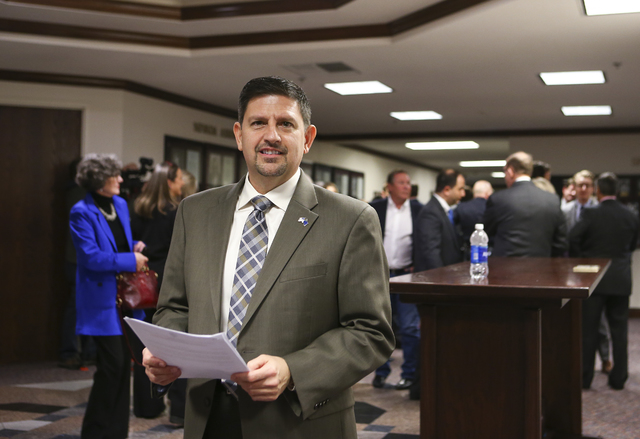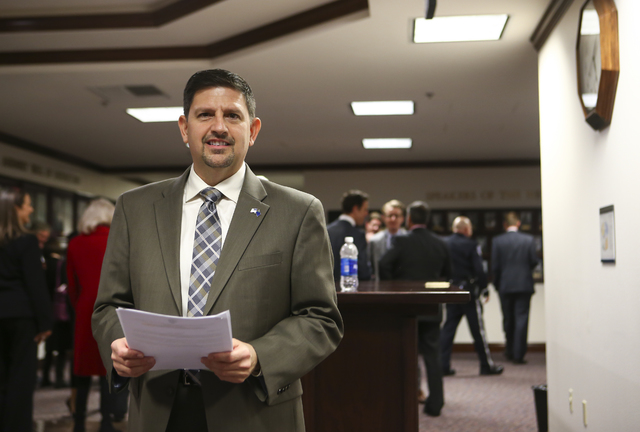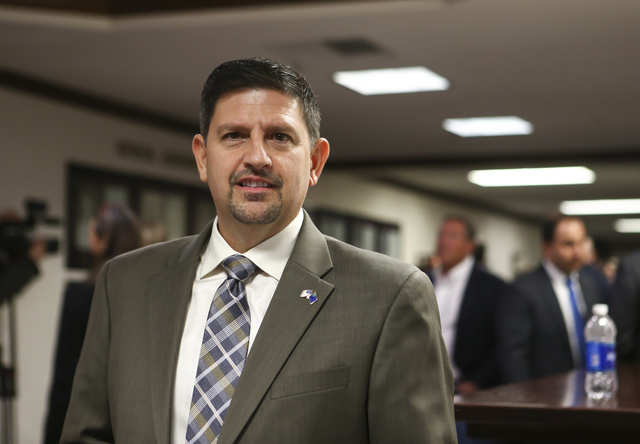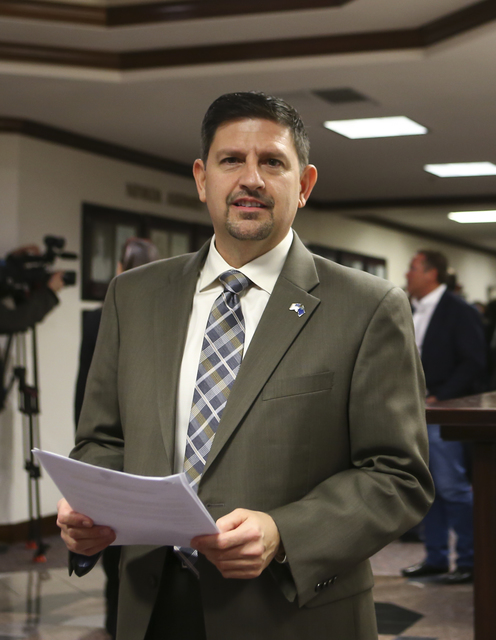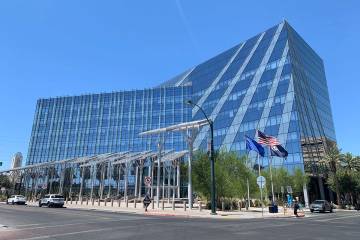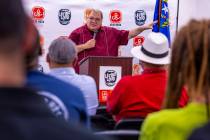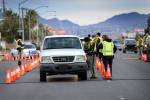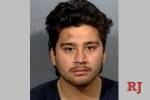Proposed bill gives DUI suspects option to install breath alcohol device
A simple breath test might help accused drunken motorists keep their driving privileges in Nevada.
State Sen. Mark Manendo, D-Las Vegas, is putting the final touches on a bill that would allow anyone arrested for driving under the influence to voluntarily install an ignition interlock system, which prevents vehicles from starting if the motorist has been drinking alcohol.
The proposed legislation — set to be announced on Jan. 30 — would ensure that alleged drunk drivers remain sober behind the wheel until they go to court to face DUI charges, Manendo said.
“We don’t want people to re-offend before they see a judge,” Manendo said. “This would allow the accused DUI drivers to keep their driver’s licenses to go to work and fulfill their family responsibilities, but only with a vehicle equipped with an ignition interlock.”
Manendo has pondered the proposal for several years, he said, but felt the time was right to introduce it as the state Legislature prepares to meet in February.
“Our theory is that if we really want to make the roads safe, we have to immediately address the ability to start your vehicle,” Manendo said. “If you can’t start your vehicle, then you can’t kill someone with it.”
Nevada would be the 30th state to enact such a law, supporters of the proposed bill said. The devices now are only issued in Nevada at a judge’s discretion after sentencing for a first or second DUI conviction.
If Manendo’s proposed bill were already enacted, more than 9,000 people arrested on suspicion for DUI would have been eligible to opt for installing the devices in 2015. Of those arrests, less than half were convicted, state records show. However, numbers were not available to determine how many of those people were arrested for a second DUI offense while waiting for a hearing to resolve the initial case.
Sean Sullivan, a Las Vegas attorney specializing in DUI cases, cautioned that Manendo’s proposal could lead to unnecessary costs for accused drivers who win their trial.
“He’s looking for utopia,” Sullivan said. “I get it, he wants to keep people protected. But some people may be wrongly punished as a way to protect society.”
INTERLOCKING ARGUMENTS
Of the seven vendors approved to work in Nevada, three companies install the ignition interlock devices for free. Monthly maintenance and rental fees hover around $60, said Victoria Hauan, the program manager for impaired driving at the state’s Office of Traffic Safety. When removed, the devices are returned to the vendors.
Only 758 ignition interlocks were installed in vehicles across Nevada in 2014, well below Texas, which ranked first in the country with 29,895 installed devices, Hauan said, citing figures from the nonprofit Traffic Injury Research Foundation.
In the middle of the pack, 14,615 devices were installed in vehicles in Washington, while 5,342 were reported in Oregon.
“It’s just not used that much in Nevada because there is a lot of misconception about the cost of these devices,” Hauan said. “When I talk to judges, they seem to think that the ignition interlocks are expensive, but I periodically have to educate people about what’s involved and what the costs really are.”
For now, anyone charged with a DUI has their license revoked, said Kevin Malone, a spokesman for the Nevada Department of Motor Vehicles.
The arresting officer issues a temporary seven-day license to the accused drunken driver. The motorist can request an administrative hearing, where a judge could decide whether to revoke or reinstate the license.
Those appealing their cases can also ask the DMV for a temporary license until the administrative hearing date, which typically takes about 90 days from filing, Malone said. First-time misdemeanor DUI offenders who don’t file an appeal get their driver’s licenses revoked for 90 days.
If his bill is approved by the state Legislature, Manendo said the current rules would remain in place.
However, those opting to install the ignition interlock devices would receive restricted driver’s licenses without having to go through an administrative hearing with the DMV, Manendo said.
“It sounds like he’s trying to give people options, and that’s certainly admirable,” said Amy Rose, legal director for the American Civil Liberties of Nevada, which supports the use of ignition interlock systems that do not collect GPS data.
“Being accused of a DUI can have very real implications like not being able to work, run errands or take care of the family,” Rose said. “If we can help people get back to their everyday lives after arrest, then this might be something we should really consider.”
There are a few ways to keep drivers from cheating, Manendo said.
To avoid someone else from blowing into the ignition interlocks, most are equipped with tamper-proof seals and a feature that requires motorists to blow into the device at random intervals while driving, according to MADD.
The vehicle won’t stop if the driver fails a test while driving; instead, the horn will blare or the lights will flash to alert law enforcement officers, MADD officials said. Also, gauges ensure a driver can’t blow compressed air into the device.
Drivers caught using a different vehicle could face penalties, Manendo said.
“Ignition interlocks would keep offenders from committing the crime in their vehicles again, and it’s hard to cheat those systems,” said Kathleen Bienenstein, program coordinator for MADD’s affiliate in Southern Nevada.
ARRESTS DECLINE SLIGHTLY
Across Nevada, 9,111 people were arrested on suspicion of DUI in 2015, down from 9,303 arrests a year earlier, according to the most recent figures provided by the state’s Department of Public Safety. Those arrests resulted in 4,436 convictions in 2015, down from 4,997 in 2014.
The latest public safety figures also show that 2,436 drivers were arrested in 2015 for DUI in Clark County, resulting in 1,664 people who were found guilty.
Preliminary figures released this month by the Nevada Department of Transportation show 66 alcohol-related crashes were reported statewide last year, a 15.4 percent decrease from 2015. There were also 77 alcohol-related fatalities in 2016, down 11.5 percent from a year earlier.
In Clark County, 42 alcohol-related crashes were reported in 2016, down 19.2 percent from 2015. There were also 48 alcohol-related fatalities last year, down 18.6 percent from 2015.
Sandy Heverly, executive of the Nevada nonprofit Stop DUI, said Manendo’s bill could help save additional lives.
“It will make our roads safer by keeping drunk drivers from committing this crime again while waiting for a hearing,” Heverly said. “It’s a wonderful idea, and we hope that we can persuade our Legislature to support and pass this bill so that we can save more lives as quickly as possible.”
Contact Art Marroquin at amarroquin@reviewjournal.com or 702-383-0336. Find @AMarroquin_LV on Twitter.



